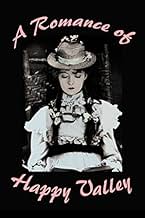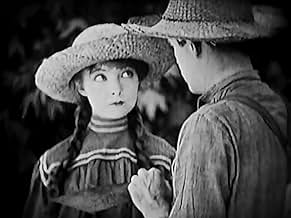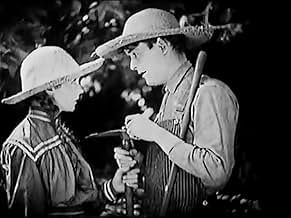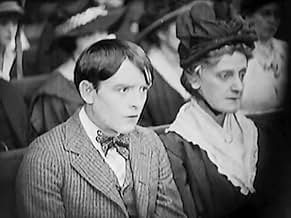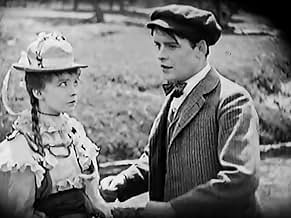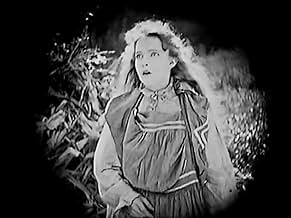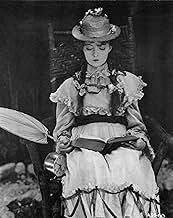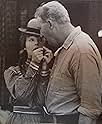John Logan leaves his parents and sweetheart in bucolic Happy Valley to make his fortune in the city. Those he left behind become miserable and beleaguered in his absence, but after several ... Read allJohn Logan leaves his parents and sweetheart in bucolic Happy Valley to make his fortune in the city. Those he left behind become miserable and beleaguered in his absence, but after several years he returns, a wealthy man.John Logan leaves his parents and sweetheart in bucolic Happy Valley to make his fortune in the city. Those he left behind become miserable and beleaguered in his absence, but after several years he returns, a wealthy man.
Carol Dempster
- Girl John Logan meets in New York
- (uncredited)
- Director
- Writers
- All cast & crew
- Production, box office & more at IMDbPro
Featured reviews
Back in the early 20th century, D.W. Griffith was an innovative filmmaker. He managed to tell wonderful stories and was wildly popular through the 1910s. However, as the years passed, Griffith went from being an innovator to being very old fashioned and stodgy. It wasn't that his films had changed so much as times had changed and he hadn't kept up with them. This is strongly evident with his "A Romance of Happy Valley"—a film which worked in 1919 when it debuted but which would just seem hokey into the 1920s. This is because the film is extremely moralistic and the subtitles often come off as preachy homilies than anything else.
The story is one close to Griffith's heart. After all, like the characters in the story, he grew up in rural Kentucky and he idealized its simple way of life. Oddly, however, the film decries the evils of moving to the big city—something Griffith himself did when he packed up and moved to Los Angeles. While the city was hardly a metropolis at the time, compared to his native Kentucky, it was practically sin city! The story is about a country boy named Johnny. After hearing a New Yorker talk about how wonderful the big city is, Johnny is determined to go there and make his fortune. The problems are that Jennie (Lillian Gish) is in love with him and his parents have worked hard on the farm in order to pass it down to him. Regardless, he eventually does go to New York and soon learns about the drudgeries of city life. And, while he promised to return in one year, one year soon stretches to eight! What's to become of Jennie and Johnny's farm? If you could re-write the heavy-handed intertitle cards (which sound more like the teachings of Norman Vincent Peale than those of a filmmaker), didn't use white folks painted black* as well as NOT made all the references to Judas Iscariot for one of the characters, the film would have worked a lot better. After all, the ending is very creative and the cinematography was lovely. Worth seeing but is extremely old fashioned and is not among Griffith's better work. And, if you've seen other films like Griffith's "Home, Sweet Home" you'll see that the themes in "A Romance of Happy Valley" are often repeated in his work.
*After watching this film and other Griffith films (especially "Birth of a Nation"), I can only conclude that Griffith must have really hated black people. Again and again, instead of hiring black actors, he usually just had white guys paint themselves with burnt cork to play black parts. An enlightened guy he wasn't—and may help explain why such an important early filmmaker is all but forgotten today.
The story is one close to Griffith's heart. After all, like the characters in the story, he grew up in rural Kentucky and he idealized its simple way of life. Oddly, however, the film decries the evils of moving to the big city—something Griffith himself did when he packed up and moved to Los Angeles. While the city was hardly a metropolis at the time, compared to his native Kentucky, it was practically sin city! The story is about a country boy named Johnny. After hearing a New Yorker talk about how wonderful the big city is, Johnny is determined to go there and make his fortune. The problems are that Jennie (Lillian Gish) is in love with him and his parents have worked hard on the farm in order to pass it down to him. Regardless, he eventually does go to New York and soon learns about the drudgeries of city life. And, while he promised to return in one year, one year soon stretches to eight! What's to become of Jennie and Johnny's farm? If you could re-write the heavy-handed intertitle cards (which sound more like the teachings of Norman Vincent Peale than those of a filmmaker), didn't use white folks painted black* as well as NOT made all the references to Judas Iscariot for one of the characters, the film would have worked a lot better. After all, the ending is very creative and the cinematography was lovely. Worth seeing but is extremely old fashioned and is not among Griffith's better work. And, if you've seen other films like Griffith's "Home, Sweet Home" you'll see that the themes in "A Romance of Happy Valley" are often repeated in his work.
*After watching this film and other Griffith films (especially "Birth of a Nation"), I can only conclude that Griffith must have really hated black people. Again and again, instead of hiring black actors, he usually just had white guys paint themselves with burnt cork to play black parts. An enlightened guy he wasn't—and may help explain why such an important early filmmaker is all but forgotten today.
For many years, this film was among a number of D. W. Griffith films from the 1918-1919 season which were considered irretrievably lost. In the 1970s it was discovered in the Gosmofilmfund in Russia, and through some complicated negotiations was acquired by the Museum of Modern Art in time for the Griffth centenary in 1975. Prints in English have the subtitles replaced, as the Russian print was subtitled in Ukrainian. The story is a simple one and personally close to Griffith's heart - a Kentucky lad, played by Robert Harron, is an inventor and hears of opportunity in New York. Although the townsfolk, his mother and father, and his sweetheart, played by Lillian Gish, all try to restrain him from leaving Happy Valley, he does so. In New York, the boy works tirelessly on his invention for eight years and resists a number of temptations. Little does he know that back home, his sweetheart is struggling with similar issues, and when the foreclosure notice comes on the family home, his father, whose opposition to the boy's departure to New York was particularly noisome, experiences a major crisis of temptation himself. The title card identifies this as a "Griffith Short Story" vehicle, and it plays like one of Griffith's Biograph shorts, only much longer. It is not one of his most technically accomplished films, and there are some uncomfortable racial characterizations, though nothing of the kind witnessed in "The Birth of a Nation." But it is a chamber movie, sort of a sketch for "True Heart Susie" and "Way Down East," rural stories told on a more ambitious scale. It contains much of Griffith's idealized vision of his childhood Kentucky, and the desperation of the father may have drawn to some extent on Griffth's own father's struggles late in life. Overall, it is a sweet, unpretentious little film which mean, and does, no harm to anyone. Not a major masterpiece, but an attractive film in a genre that was a Griffith specialty, local in orientation but universal in theme.
Must all director D.W. Griffith's stories make a moral point? "A Romance of Happy Valley" offers one readily: "Harm not the stranger within your gates, lest you yourself be hurt." By the film's end, this is shown to be excellent advice. At a Kentucky back-country inn, poor country boy Robert Harron (as John L. Logan Jr.) dreams about making his fortune in the Big City (New York). Hard-working father George Fawcett (as Logan Sr.) and Bible-loving mother Kate Bruce (as Mrs. Logan) don't want to see their son gallivant off to the Wicked City; they want him to remain down on the farm. Girl-next-door Lillian Gish (as Jennie Timberlake) is also afraid she will lose Harron to big city ways
Robert Harron and Lillian Gish. Corn rustling in the wind. Rustic fences. Of course, this an absolutely gorgeous picture. Griffith and photographer G.W. Bitzer create an extraordinary, classic landscape; and, "A Romance of Happy Valley" is one of their most perfect collaborations. Harron is especially poignant; portraying "Johnny Logan" as an innocent country boy who longs to better his lot in life. His is the film's struggle: the comfort and stability known in simple, rural life vs. the promise of wealth in the unknown, urban city. The story is about Temptation; and Harron must navigate it successfully, or die trying
The film begins with lovely images: Harron working the fields; Gish in her fenced lawn. Then, they court; in a great scene, the two use their hands on a farm tool, to express their emotions. After Harron decides to leave for New York, Gish and Harron's parents endeavor to change his mind. Gish dons herself in the latest fashions, and his parents trust their Minister will change Harron's wayward ways. In Church, Gish looks woeful; and Harron looks desperately ill (showing his soul). The plan works; however, Harron's salvation is short-lived. Then, Harron leaves for Sin City; where he decides to make his fortune by inventing a toy frog that swims
The symbolism is rich; and, when the toy frog swims, so does Harron. When he goes home, Harron finds his parents have grown desperately poor. Mother Bruce has faith that the Lord will provide. Father Fawcett is unable to avoid his own Temptation; so, to save the farm, he decides to assault the rich stranger in town, unaware the "city slicker" is his own son. Although he is matured by his experience in the city, Harron's character is untainted by Temptation; note the nonthreatening manner Harron displays at Gish's bedroom window, near the end. Harron startles, but does not frighten Gish; he is transformed into an ideal man, who retains his better country traits.
Robert Harron was the "Best Actor" performing in films during 1919, with the following remarkable, and highly recommended, features: A Romance of Happy Valley (1919), The Girl Who Stayed at Home (1919), The Greatest Question (1919), and True Heart Susie (1919). Frequent co-star Lillian Gish was filmdom's "Best Actress"; of these films, she is most remarkable in "True Heart Susie". Griffith's reliable supporting cast is wonderful, as always. Aside from the aforementioned supporting players, "Happy Valley" includes the reliably smarmy Bertram Grassby as "Judas", who is said to be descended from the original Iscariot. And, Carol Dempster has a nice turn as a wicked city woman. The ending is very exciting, and Griffith improves significantly upon his earlier "The Son's Return" (1909).
********* A Romance of Happy Valley (1/26/19) D.W. Griffith ~ Robert Harron, Lillian Gish, George Fawcett, Kate Bruce
Robert Harron and Lillian Gish. Corn rustling in the wind. Rustic fences. Of course, this an absolutely gorgeous picture. Griffith and photographer G.W. Bitzer create an extraordinary, classic landscape; and, "A Romance of Happy Valley" is one of their most perfect collaborations. Harron is especially poignant; portraying "Johnny Logan" as an innocent country boy who longs to better his lot in life. His is the film's struggle: the comfort and stability known in simple, rural life vs. the promise of wealth in the unknown, urban city. The story is about Temptation; and Harron must navigate it successfully, or die trying
The film begins with lovely images: Harron working the fields; Gish in her fenced lawn. Then, they court; in a great scene, the two use their hands on a farm tool, to express their emotions. After Harron decides to leave for New York, Gish and Harron's parents endeavor to change his mind. Gish dons herself in the latest fashions, and his parents trust their Minister will change Harron's wayward ways. In Church, Gish looks woeful; and Harron looks desperately ill (showing his soul). The plan works; however, Harron's salvation is short-lived. Then, Harron leaves for Sin City; where he decides to make his fortune by inventing a toy frog that swims
The symbolism is rich; and, when the toy frog swims, so does Harron. When he goes home, Harron finds his parents have grown desperately poor. Mother Bruce has faith that the Lord will provide. Father Fawcett is unable to avoid his own Temptation; so, to save the farm, he decides to assault the rich stranger in town, unaware the "city slicker" is his own son. Although he is matured by his experience in the city, Harron's character is untainted by Temptation; note the nonthreatening manner Harron displays at Gish's bedroom window, near the end. Harron startles, but does not frighten Gish; he is transformed into an ideal man, who retains his better country traits.
Robert Harron was the "Best Actor" performing in films during 1919, with the following remarkable, and highly recommended, features: A Romance of Happy Valley (1919), The Girl Who Stayed at Home (1919), The Greatest Question (1919), and True Heart Susie (1919). Frequent co-star Lillian Gish was filmdom's "Best Actress"; of these films, she is most remarkable in "True Heart Susie". Griffith's reliable supporting cast is wonderful, as always. Aside from the aforementioned supporting players, "Happy Valley" includes the reliably smarmy Bertram Grassby as "Judas", who is said to be descended from the original Iscariot. And, Carol Dempster has a nice turn as a wicked city woman. The ending is very exciting, and Griffith improves significantly upon his earlier "The Son's Return" (1909).
********* A Romance of Happy Valley (1/26/19) D.W. Griffith ~ Robert Harron, Lillian Gish, George Fawcett, Kate Bruce
"A Romance of Happy Valley" is a good smaller production from D.W. Griffith. It's very similar to and somewhat lesser than his later film also of the same year, "True Heart Susie". Both pictures star Lillian Gish and Robert Harron as lovers estranged for considerable length and are coming-of-age melodramas set in America's rural South. I'm not positive, but the same sets may have been used in both films; regardless, the locations are similar looking.
As in the later film, Gish plays a naïve, long-suffering country girl who awaits Harron's return from making good in the city. The narrative here isn't as well developed as that for "True Heart Susie" and, perhaps, one can view "A Romance of Happy Valley" as a bit of a trial run for the later film. The frog toy invention Harron makes good with seems as though it must be a joke I'm not getting. And, the contrived ending reused from Griffith's short film "The Son's Return" (1909) and the Judas character were unnecessary and irrelevant to the main story. A more abrupt reunion finale without the cheap surprise gimmicks would have been preferred.
Nevertheless, I like the film for its nice photography and good scene dissection between the picturesque countryside and closer views of the characters. The beauty of Bitzer's cinematography isn't as evident in the somewhat worn out print for this film as it is in the recent Film Preservation Associates restoration of "True Heart Susie" and in some of Griffith's other more prominent releases, but since "A Romance of Happy Valley" was considered lost until a print was discovered in a Soviet archive in 1971, we should, I suppose, consider ourselves fortunate. Additionally, arguably the best part of this picture, as was often the case in her films, is Lillian Gish's performance. She really makes her character appear featherbrained in this one, with her nervous skipping and wide-eyed look. The scene where she jerks her head right and left causing her hat to flip sides each time with her while she argues her need for more fashionable clothes to her father was especially amusing. And, her scenes with Harron's coat on a scarecrow rack, as a substitute for her estranged lover, are pitiful and poignant. (EDIT: It's interesting how similar this scene is to the one in "The Artist" (2011); I wonder if that's intentionally so.)
As in the later film, Gish plays a naïve, long-suffering country girl who awaits Harron's return from making good in the city. The narrative here isn't as well developed as that for "True Heart Susie" and, perhaps, one can view "A Romance of Happy Valley" as a bit of a trial run for the later film. The frog toy invention Harron makes good with seems as though it must be a joke I'm not getting. And, the contrived ending reused from Griffith's short film "The Son's Return" (1909) and the Judas character were unnecessary and irrelevant to the main story. A more abrupt reunion finale without the cheap surprise gimmicks would have been preferred.
Nevertheless, I like the film for its nice photography and good scene dissection between the picturesque countryside and closer views of the characters. The beauty of Bitzer's cinematography isn't as evident in the somewhat worn out print for this film as it is in the recent Film Preservation Associates restoration of "True Heart Susie" and in some of Griffith's other more prominent releases, but since "A Romance of Happy Valley" was considered lost until a print was discovered in a Soviet archive in 1971, we should, I suppose, consider ourselves fortunate. Additionally, arguably the best part of this picture, as was often the case in her films, is Lillian Gish's performance. She really makes her character appear featherbrained in this one, with her nervous skipping and wide-eyed look. The scene where she jerks her head right and left causing her hat to flip sides each time with her while she argues her need for more fashionable clothes to her father was especially amusing. And, her scenes with Harron's coat on a scarecrow rack, as a substitute for her estranged lover, are pitiful and poignant. (EDIT: It's interesting how similar this scene is to the one in "The Artist" (2011); I wonder if that's intentionally so.)
Watching silent films has been of great fascination for quite some time now and there are some truly fine ones, some revolutionary technically or in terms of subject. Not all are great and a few controversial, but there are many great or iconic ones. Among the best of them is the best of DW Griffith, and the more that has been seen of Griffith's work (short and feature films) the more interesting he has come to me. We also have Griffith regular Lillian Gish, among the greatest silent film actresses, in the lead role.
'A Romance of Happy Valley' is not one of Griffith's best, it is not quite 'Intolerance', 'True Heart Susie', 'Orphans of the Storm', 'Way Down East' and 'Broken Blossoms' level, all very good to brilliant. Much prefer it though over 'Birth of a Nation', appreciate its importance but the second half spoilt it significantly for me, and especially 'Abraham Lincoln' (with him being one of not many silent film directors to clearly not transition well into sound). 'A Romance of Happy Valley' is somewhere in the middle as far as his work goes and is a very good representation of Gish.
There is actually not a huge amount wrong with 'A Romance of Happy Valley' in my view. The story is very slight, making for some ploddy moments in the less eventful stretches, and quite old-fashioned.
Do agree too that the ending came over as far-fetched and quite weird even, actually found it rather out of place and shoehorned in and it is a rare case of me saying that an abrupt and pat ending (usually dislike this kind of ending) would have been preferable.
Gish however is wonderful as ever, she is incredibly endearing, radiates charm and has amusing comic timing. She also has the right amount of pathos, something that she conveyed better than any other actress at that time. Robert Harron gives another sensitive and nuanced performance, succeeding in making his on paper slightly bland character interesting. George Fawcett chills the bone and it is scary at how much his character gets away with. Griffith's direction has been more creative in his other films, but it is understated and shows someone that clearly knew what he was doing.
Have no qualms with the production values, the scenery is quaint and the photography has beauty and intimacy, even if this aspect is more distinct in other Griffith films. The story is not perfect, but it has a very big heart, is rich in charm and there is poignant emotion. The characters are not meaty but they're worth engaging with.
In conclusion, good if not great. 7/10
'A Romance of Happy Valley' is not one of Griffith's best, it is not quite 'Intolerance', 'True Heart Susie', 'Orphans of the Storm', 'Way Down East' and 'Broken Blossoms' level, all very good to brilliant. Much prefer it though over 'Birth of a Nation', appreciate its importance but the second half spoilt it significantly for me, and especially 'Abraham Lincoln' (with him being one of not many silent film directors to clearly not transition well into sound). 'A Romance of Happy Valley' is somewhere in the middle as far as his work goes and is a very good representation of Gish.
There is actually not a huge amount wrong with 'A Romance of Happy Valley' in my view. The story is very slight, making for some ploddy moments in the less eventful stretches, and quite old-fashioned.
Do agree too that the ending came over as far-fetched and quite weird even, actually found it rather out of place and shoehorned in and it is a rare case of me saying that an abrupt and pat ending (usually dislike this kind of ending) would have been preferable.
Gish however is wonderful as ever, she is incredibly endearing, radiates charm and has amusing comic timing. She also has the right amount of pathos, something that she conveyed better than any other actress at that time. Robert Harron gives another sensitive and nuanced performance, succeeding in making his on paper slightly bland character interesting. George Fawcett chills the bone and it is scary at how much his character gets away with. Griffith's direction has been more creative in his other films, but it is understated and shows someone that clearly knew what he was doing.
Have no qualms with the production values, the scenery is quaint and the photography has beauty and intimacy, even if this aspect is more distinct in other Griffith films. The story is not perfect, but it has a very big heart, is rich in charm and there is poignant emotion. The characters are not meaty but they're worth engaging with.
In conclusion, good if not great. 7/10
Did you know
- TriviaBelieved lost for almost 50 years, a print was discovered in 1965 in the State Film Archives of the Soviet Union, which donated it to the Museum of Modern Art.
Details
- Release date
- Country of origin
- Languages
- Also known as
- The Romance of Happy Valley
- Production company
- See more company credits at IMDbPro
- Runtime
- 1h 16m(76 min)
- Color
- Sound mix
- Aspect ratio
- 1.33 : 1
Contribute to this page
Suggest an edit or add missing content

